Nepal’s Geostrategic Location: Realist Imperatives on Foreign Policy
DOI:
https://doi.org/10.3126/irjmmc.v5i4.70821Keywords:
Nepal, Realist, Interest, Powers, Realism, National, Foreign, Security, Imperatives, International, China, IndiaAbstract
Realist imperatives in foreign policy emphasize the pursuit of national interests, power balance, and pragmatic decision-making in an anarchic international system. This study aims to analyze Nepal's foreign policy through a realist perspective, focusing on its historical evolution, challenges, and opportunities. An exploratory research design is employed, using secondary data from peer-reviewed journals, historical records, academic books, policy reports, and governmental publications. The publication period of the sources ranges between 1963 and 2023. The study finds that Nepal’s foreign policy decisions are significantly influenced by its geopolitical position and the need to balance relationships with neighboring powers India and China. The implication of this study is that realist theory provides a valuable framework for understanding how small states like Nepal navigate complex international dynamics to safeguard their national interests.
Downloads
Downloads
Published
How to Cite
Issue
Section
License
Copyright (c) 2024 The Author(s)

This work is licensed under a Creative Commons Attribution-NonCommercial 4.0 International License.
This license enables reusers to distribute, remix, adapt, and build upon the material in any medium or format for noncommercial purposes only, and only so long as attribution is given to the creator.

